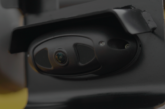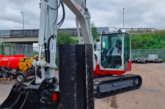 Construction Plant News talks to the Lighthouse Club’s Bill Hill about the latest support available from the charity.
Construction Plant News talks to the Lighthouse Club’s Bill Hill about the latest support available from the charity.
“Our ambition is to ensure that no construction professional has to face a crisis alone,” declares the Lighthouse Club’s CEO, Bill Hill, “and what’s more we’re putting the tools in place to make sure that’s the case.” The construction industry charity might have a distinguished 60-year pedigree of supporting tradespeople and their families at the time of most need, but the world in that time has changed radically, and the Lighthouse Club is changing with it.
“Today we recognise that the mental health of our workforce is one of the most serious issues we face, and it’s something that the industry is putting significant resources into tackling,” continues Bill. “Not only that but the means of communication is evolving rapidly, and that’s why we introduced our Construction Industry Helpline App. It’s development has been thanks to the generosity of construction software suppliers, COINS, and we’ve had over 10,000 downloads on Android since its launch.”
The app is designed to provide that first crucial step in the journey towards addressing an issue, especially for those who are not yet ready to engage in direct interaction with a counsellor, friend or support worker. It provides a wealth of resources and points of contact, and the ambition is to extend its scope still further. “With the continued help of COINS, We intend to move the concept forward, by including other health issues,” Bill explains, “whilst there are plans to allow access to the microsites of larger infrastructure projects or companies. We are presently piloting just that kind of microsite with Heathrow, for instance, where workers at that site can find details of anything from mental health first aiders, gym access and social events – all from one portal.”
 It is clear even from the anecdotal evidence of the Lighthouse Club helpline that workers in the built environment are becoming more confident and comfortable in verbalising their problems, even those that relate to their mental health, and with, on average, at least one industry professional committing suicide every two days – a higher figure than in any other sector – the need is indeed pressing. Bill Hill tells us just how vital the Lighthouse Club’s work really has become: “We’ve seen an 80 per cent increase in individuals contacting our helpline and we’re now dealing with 200 new cases every month. What we’re trying to promote is a more holistic approach, because many of the problems that are presented to our helpline staff are connected with other underlying issues. Anxiety or stress could be the result of financial difficulties, for instance, and it’s important that we send out the message that these issues need to be confronted before they inevitably escalate.
It is clear even from the anecdotal evidence of the Lighthouse Club helpline that workers in the built environment are becoming more confident and comfortable in verbalising their problems, even those that relate to their mental health, and with, on average, at least one industry professional committing suicide every two days – a higher figure than in any other sector – the need is indeed pressing. Bill Hill tells us just how vital the Lighthouse Club’s work really has become: “We’ve seen an 80 per cent increase in individuals contacting our helpline and we’re now dealing with 200 new cases every month. What we’re trying to promote is a more holistic approach, because many of the problems that are presented to our helpline staff are connected with other underlying issues. Anxiety or stress could be the result of financial difficulties, for instance, and it’s important that we send out the message that these issues need to be confronted before they inevitably escalate.
An app and helpline offers the technological routes, but there’s equally a significant effort afoot to get boots on the ground in the battle to improve mental health in construction. That’s why CITB is allocating significant resources to ensuring that staff have access to a mental health first aider at their company, and it is The Lighthouse Club that provides the training. “This is one of the best projects that CITB has undertaken in recent years, and so far we have trained up to 84 instructors. It is these individuals who deliver the two-day mental health first aid course, and these have now certified 1,200 people as mental health first aiders as a consequence. The courses we’ve been running have all been full, so there is clearly an appetite for promoting this kind of intervention, and there are plans to deliver a further 134 instructors in the months ahead.”
Of course, success will always bring its own challenges and for a charity, a significant engagement means extra resources are required – and that means money. At present, 95 per cent of the Lighthouse Club’s funding comes from relatively unpredictable sources, like events or individual and company donations, but Bill Hill is looking to complement that income with a slightly different approach. “Last year we inaugurated our company supporter programme, with the aim to provide us with the kind of predictable income stream we will require if we are to properly plan for the future. Whether it’s a manufacturer, contractor or plant hirer, an organisation can pledge an annual amount that they can afford. The aim is to raise something in the region of £1 million of vital funds for our work via the scheme and so far we’ve had pledges of annual donations from £250 all the way up to £50,000.
“There are so many different ways to communicate these days that we have to be covering so many more bases,” concludes Bill. “Whether it’s through our app, helpline or a network of mental health first aiders, our aim is to provide anyone who asks for it the support they need.”
For further information on the Lighthouse Club visit www.lighthouseclub.org









